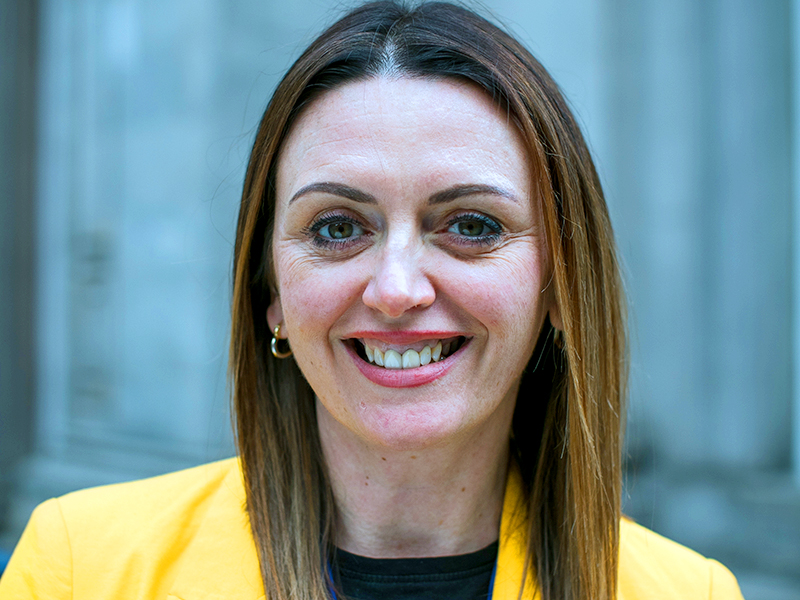Louise Stewart reflects on a recent consultation event held on Islay
After work last Tuesday I made dinner for my family and listened to my children chattering about their day at school. Then I drove for more than three hours from Glasgow to Campbeltown, the westernmost town in Britain.
Of course, it wasn’t a straightforward journey. I reached a closed road when I was just 15 miles away from my hotel. With no other route available, I had to wait for more than an hour until the road opened again. I eventually turned in for the night after 11pm, wincing as I set my alarm for 5am when our Argyll and Bute recovery workers, Ailsa and Stuart, were collecting me and my colleague Yvonne to get the ferry to Islay.
On our way to the port the next morning, we picked up Rochelle, who works for social care charity Cargomm. Partnership working is important across all aspects of what we do at WithYou - and it is even more important when working in remote communities. In order to succeed, you simply have to share resources, whether it’s experience of a particular issue, knowledge of an emerging substance, or space in a car!
I have to admit, I was feeling a little bleary eyed on the two hour ferry journey to Islay and the experience really made me appreciate Stuart and Ailsa, who travel from their homes in Kintyre to parts of Argyll and Bute including Islay, Tarbert and Lochgilpead on a weekly basis to meet their clients.
They have become used to the very early starts - not to mention being stranded when the Rest and Be Thankful is closed or ferries are cancelled. On the journey over they told me that they book ferry journeys months in advance to make sure they can get across to the islands regularly, especially during tourist season.
I love that, through my new role at WithYou, I can play a part in supporting people in beautiful - but often underserved - communities to lead happy, healthy lives. We were visiting Islay and Jura to speak to residents about the impact of drugs and alcohol, and how we can help them to establish the islands’ first ever recovery communities.
We have spent many years building connections and trust within island communities, which has brought us to this point. At WithYou, we have a wealth of experience of developing and supporting recovery communities - but we know that a cookie cutter approach won’t work on Islay and Jura, which have a combined population of around 3,500 and are home to no fewer than 10 distilleries (not to mention 5,000 wild deer on Jura alone!)
One of the people we met was a GP who told us about the impact of “ceilidh culture” - paying for services with alcohol - and their concerns about increased suicide rates on the island. It was a harrowing conversation that underscored the need for charities like WithYou to overcome logistical challenges, such as travel time and the availability of staff, to find ways to support people in remote communities.
Throughout my career, people have told me they are worried about accessing support because their neighbour, colleague or child’s teacher might see them walking into one of our services. The stigma that exists around addiction is a real barrier - and I have never felt it as keenly as I felt it there. At the same time, I was bowled over by the matter-of-factness of one man, who told me, “If you need help, you may as well ask for it. Because I can assure you, everyone already knows you’re struggling.”
The two days we spent on Islay and Jura were inspirational. I felt profoundly moved on a few occasions, including during our visit to a retreat on Jura, and I drove home to Glasgow bursting with ideas for how we can help people on the islands to develop support networks that work for them. This won’t be a recovery cafe with more than 40 attendees, like we have in Glasgow.
It’s more likely to be two people meeting for a coffee or a small group taking part in a regular walk. We will work with agencies like the Scottish Recovery Consortium to ensure that the people involved have access to the training that supports them in developing their recovery conversations and activity.
As we gathered ourselves up for the ferry back to Kennacraig, I chatted about the road closure on my journey to Campbeltown. “And you didn’t consider turning back and going home?” my colleague asked, visibly shocked. It hadn’t even crossed my mind.
But now, sitting in my house in Glasgow, I cannot help but think that, too many times, those who should be providing life-saving support to people living on Islay and in other remote parts of Scotland have turned back and gone home. I won’t do that - because, no matter where you are in Scotland, if you need support with drugs, alcohol or mental wellbeing, we are WithYou.
Louise Stewart is director of service delivery at drug and alcohol charity WithYou.







